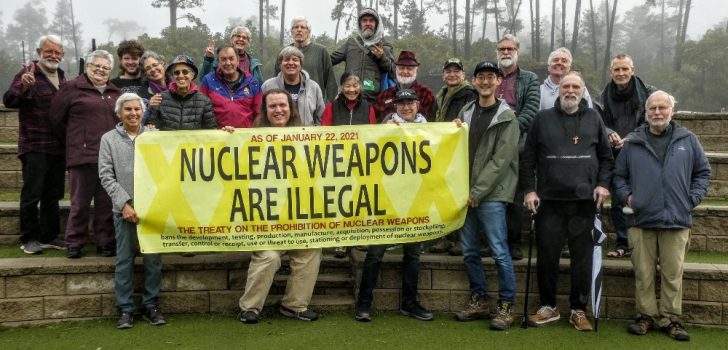A World Beyond War Is Possible
August 2024
by Fumi
When my father was just 3 years old, an atomic bomb destroyed the city where he lived, killing 140,000 people including four of his siblings. Miraculously, my father, his twin brother, his two oldest sisters, and their parents survived, even though they were less than a mile from the epicenter when the bomb exploded over Hiroshima at 8:15 a.m. on the morning of August 6, 1945.
My father retains only shards of memories from that morning: the sudden darkness around him; the shaft of light as his mother unearthed him from the rubble; the tomato a stranger gave him as they fled the city along the banks of one of its many rivers. What he does remember more vividly are scenes from later in his childhood – memories of growing up in a city with no buildings, its streets filled with orphans with nowhere to go and no one to care for them.
If we think of Hiroshima at all, we rightly think of all who died that day. I’ve been thinking more recently about all who survived. What was it like for my father to attend school with classmates, every single one of whom had lost siblings, parents, or relatives that day? What is the collective trauma of a generation that grew up in a nuclear wasteland?

Susan is standing on the bottom row, far left, holding the banner. Photo from 2023 Pacific Life Community gathering.
Our friend Susan Crane is a member of the Catholic Worker community in Redwood City, CA. She was born the same year as my father, and has spent her life speaking out against nuclear weapons. She recently received the 2024 David Hartsough Lifetime Individual War Abolisher Award by World BEYOND War.
As Catholic Workers, housing the unhoused, feeding the hungry, and protesting nuclear weapons are different expressions of the same conviction: our faith that a better world is possible.
Susan is currently serving a 7-month sentence in a German prison for her peaceful actions at Büchel Air Base, where she protested the presence of U.S. nuclear weapons. Under the Nuclear Nonproliferation Treaty, nuclear-armed states including the United States are prohibited from transferring nuclear weapons to non-nuclear-armed states like Germany. The weapons at Büchel are a clear violation of this treaty.
Susan writes in a recent letter from prison:
Outside my cell window I can see a wind turbine slowly turning and rotating as the wind direction turns. In the morning I hear doves and other birds calling to each other. They are unaware of the nuclear warheads 120 kilometers away. But we humans have no excuse for not knowing, and the judges who sentenced us have no excuse for not allowing our expert witnesses to testify about the illegality of those weapons… Still, here in the vigil behind bars, I think of the poor whom we serve, and the billions of dollars wasted by U.S. warmaking, and by war-making around the world.
Susan’s life is a witness to the hope that a world without the generation-wide trauma endured by my father and his classmates is possible. Her imprisonment is an indictment of a political system in which it is legal to deploy nuclear warheads, but illegal to protest them.
As Catholic Workers, housing the unhoused, feeding the hungry, and protesting nuclear weapons are different expressions of the same conviction: our faith that a better world is possible. We stand with Susan. Will you?

Want to support Susan?
Send her a letter and tell her you heard about her work for peace from Dandelion House.
Letters can be sent to:
Susan Crane
JVA Koblenz – Offener Vollzug
Simmerner Str. 14a
56075 Koblenz GERMANY
